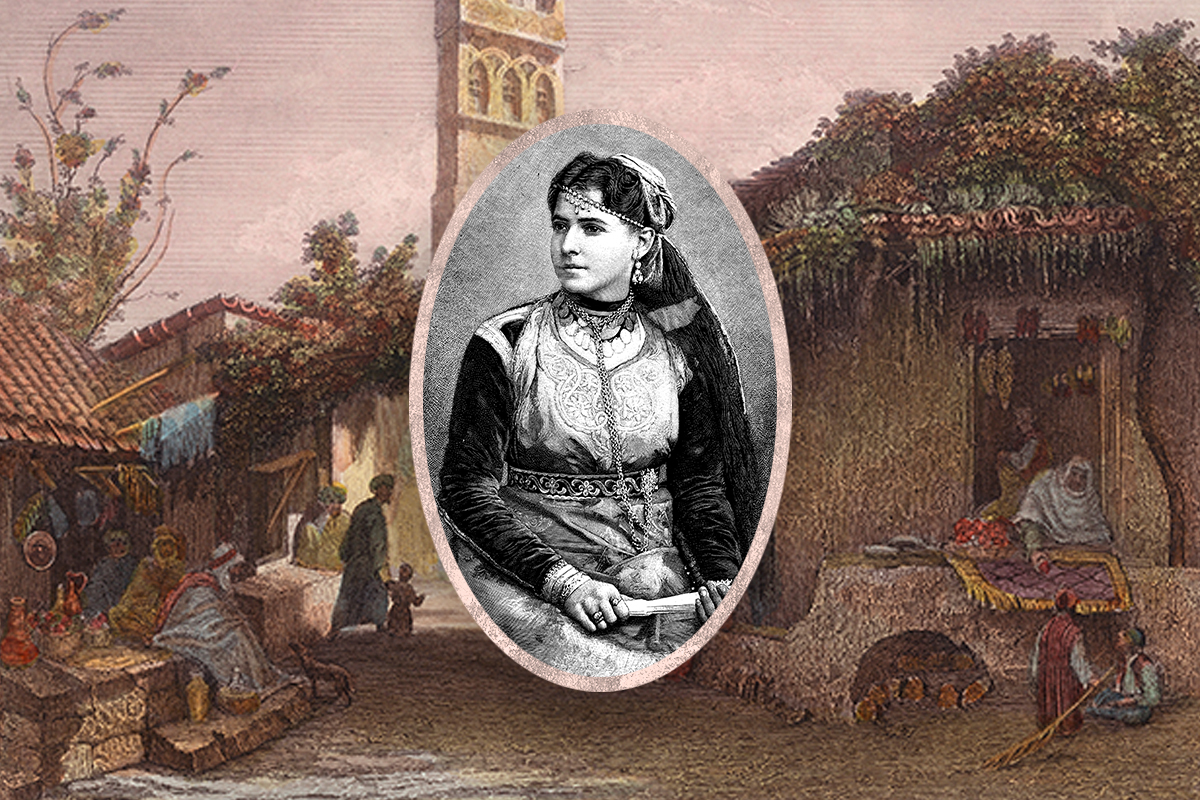In one of my favorite videos of her, my aunt Genevieve quizzes my sister, Leah, and me on how much salt to put in our family’s signature galettes. “Not too full a teaspoon,” she tells us in French, “or people will think they’re too salty. But if it’s too flat, they won’t have any taste.”
Leah leans on her hand, listening, while I roll slits into a thin continent of dough on the counter with a tool called a roulette. That implement, a miniature ridged wheel on a handle, was my grandmother’s back in Algeria. One summer, we searched all over Paris for one to take back to the U.S. so we could make galettes at home, but couldn’t find one. The roulette creates neat, even vents across the pastry before we cut the individual biscuits out with round glasses — otherwise we have to pinch holes throughout by hand. Done right, the result is a salty, flaky biscuit with layers and crunch, especially delicious when dipped in coffee. The whole batch is always consumed within two days.
Leah and I have been making galettes — and couronnes, their donut-shaped sweet counterpart — with Genevieve on trips to France since we were little. But the batch we made in August 2019, captured in the video, was different, the standard higher. When I roll the dough out too much, Genevieve chides me, telling me it’ll fall apart. The next one I make is too thick, and she says it won’t cook. She’s drilling us because she won’t be able to correct us for much longer: She’s dying.
At the end of last June, after two surreal years, pancreatic cancer took Genevieve from us. She was an exceptional person, brilliant and funny and elegant and kind, and her loss was devastating because I loved her. It also meant losing a piece of history. My father and his sister were the last of something: Algerian Jews, they fled a home and a community in Constantine that no longer exists. Now that she’s gone, he is the only member of our family who remembers Algeria.
The story of France and Algeria is becoming common knowledge. After over a century of colonization beginning in 1830, Algeria won its independence from France in 1962. For decades, the French government refused to address its inhumane treatment of Algerians. Recently, new restrictions on sharing images of police officers have brought past incidents of police brutality back into the spotlight. Among these instances of violence was a protest on October 17, 1961: as many as 200 Algerians were killed as they peacefully marched against a highly restrictive curfew. French officials only formally acknowledged this horrific incident for the first time in 2001, when a plaque commemorating what is now called the “Paris massacre” was unveiled near the Pont St-Michel.
But the history of Algeria’s Jews is much less known. Jews had lived in Algeria for thousands of years before French colonists arrived, sometimes suffering for their minority status in a Muslim-dominated society. In the 19th century, Jews accepted French citizenship in hopes of improving their inferior position. They lost that citizenship (and, in many cases, their livelihoods) under the Vichy government in 1941, and then had it restored two years later, in 1943.
By the mid-20th century, when my father and Genevieve were growing up, the two indigenous populations lived in relative harmony. They attended the same elementary schools, and my grandfather, a lawyer, had Muslim clients as well as Jewish ones. But Jewish families felt more closely tied to France, and largely spoke French at home instead of Arabic. When Algeria became independent after the war, the Jews found themselves displaced. Considered French by the Algerians and Algerian by the French, many had to abandon millennia of history in a hurry.
My grandparents started life over in their 50s, leaving behind the house for which they’d saved up for decades. Their attempts to find acceptance in their adopted French home were often met with antisemitism. After a successful career in Constantine, my grandfather struggled for years to find work in France; Genevieve told us how she worried about him as he swept the floor of their apartment day after day, bereft of any other occupation. At 12, she’d gone on what she thought was summer vacation and never returned.
Almost 200,000 Jews called Algeria home at the start of the 1960s. Some could trace their roots back to the pre-Roman period; others had fled the Spanish Inquisition. Today, there is virtually no Jewish population to be found. The synagogue where my father had his bar mitzvah was destroyed. Most others have been converted into mosques.
Losing Genevieve meant losing a link to a vanished place, one that I can never really visit. But Genevieve and my father did pass down their specific Sephardic and Mizrahi traditions to me — and they don’t fit the common perception of American Jewry. We make semolina couscous along with our couronnes and galettes, and tchoukchouka, our version of Israeli shakshuka. Our traditional music resonates with North African and Middle Eastern friends as much as with other Jews.
In quarantine, my father, Leah, and I have been going through the things my grandmother saved from Algeria. Mamy moved them from apartment to apartment many times, and they were clearly precious to her: the metal basin she took to the hammam and my great-grandmother’s marriage contract. I’m grateful that some of these rituals and objects have made their way to me across my father’s various homes, from Algeria to Paris and, ultimately, to Washington, DC, where I grew up.
But at the same time, I mourn the many stories I won’t hear and the world of my father’s youth that’s disappeared.
Though COVID didn’t cause Genevieve’s death, it now feels linked in my mind with the other enormous casualties of the pandemic — those hundreds of thousands who died unnecessarily, and our daily routines and realities. Cut off from many of my anchors, I responded to losing Genevieve by seeking to somehow rectify earlier, ancestral losses — and avoid future ones.
Lots of people started baking in quarantine; I dug out the binder of handwritten recipes from Mamy, interpreting her imprecise measurements through trial and error. What did “a glass of oil” mean, or “a packet of yeast,” or “a dinner-table-spoon of salt”? I didn’t have her culinary talent, but I did have some of Genevieve’s training. Amidst the many sadnesses of this time, I’ve had the great pleasure of placing a homemade challah before my father and hearing him say it tastes like he remembers. Though the place and the people may disappear, the flavors and smells can survive.
One of our family’s rites takes place when a guest’s visit ends, or when someone leaves for a trip. At the moment of departure, we say “trek salama” — “safe travels” in Arabic — and throw water across the threshold. The departing must then re-enter the house and greet everyone again before leaving, a pantomime of their next arrival. This superstitiously ensures their return. In this way, every goodbye contains a hello.
I’d like to believe Genevieve’s farewell shares that quality. When my father arrived in France to see her for the last time, he brought with him a batch of galettes that Leah had made all the way across the ocean, on her own. Genevieve smiled, pleased with the results. “Le transfert est complet,” she said — French for “the transfer is complete.” Upon our return to the U.S. after the funeral and the shiva, Leah and I were surprised to find a roulette, the twin of Genevieve’s, in a drawer in our parents’ kitchen, where it had been all along.



